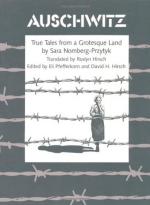
|
| Name: _________________________ | Period: ___________________ |
This test consists of 15 multiple choice questions and 5 short answer questions.
Multiple Choice Questions
1. What were the prisoners receiving according to Sara in Chapter 31?
(a) Packages of food.
(b) More water.
(c) Showers.
(d) New clothes.
2. Who thought that depriving a human being of the knowledge of death is depriving them of their dignity?
(a) Sara.
(b) Sochi.
(c) Mila.
(d) Magna.
3. What does the Editor say of Fela's values in the Editor's Afterword?
(a) They were forced upon Sara.
(b) They were forgotten.
(c) They were corrupt.
(d) She upheld them.
4. How does the Editor qualify Sara's stories?
(a) Emotional.
(b) Exaggerated.
(c) Simply told.
(d) True.
5. What did the speech reprinted in the newspaper in Chapter 33 say to resist?
(a) Fear of death.
(b) Pity for the Germans.
(c) Vengeance.
(d) Fear of the Germans.
6. What does Sara wonder at the start of Chapter 25?
(a) Why she couldn't save anyone.
(b) How she could have let herself be captured.
(c) How to put a price on a life.
(d) How she was able to survive.
7. How long did Mala resist torture at the hands of the SS?
(a) For days.
(b) For hours.
(c) For weeks.
(d) For a few minutes.
8. What does Sara say she did not know how to handle in Chapter 39?
(a) Food.
(b) Freedom.
(c) Friendship.
(d) Attention.
9. What did Sara say the prisoners started singing at midnight on New Years Eve 1944?
(a) Russian songs.
(b) Yiddish songs.
(c) The Internationale.
(d) Christmas songs.
10. Who was present in Rostock at the same time as Sara?
(a) Polish civilians.
(b) German civilians.
(c) Russian POW.
(d) SS and Auschwitz functionaries.
11. Where was Mala's boyfriend's corpse hung?
(a) On the gate.
(b) Near his block.
(c) Next to the woman's camp.
(d) In Sara's block.
12. What does Sara's story stimulate the Reader to do according to the Editor?
(a) Think on complex issues.
(b) Learn more about the Holocaust.
(c) Learn about her.
(d) Think about the Jewish faith.
13. What news did Hans bring to Auschwitz?
(a) The American landing in Normandy.
(b) The capitulation of Germany.
(c) The Red Army crossed into Prussia.
(d) The bombing of Dresden.
14. Who was the speech reprinted in the newspaper in Chapter 33 addressed to?
(a) Russian soldiers.
(b) German soldiers.
(c) Prisoners.
(d) German civilians.
15. What did the SS soldiers know by the time of the 1945 New Year?
(a) That they would be captured.
(b) That they would have to flee.
(c) That they could not kill everyone in the camp.
(d) That the war was lost.
Short Answer Questions
1. What does Sara say their was few of in Auschwitz?
2. Where does Sara say Mala was from?
3. When did the SS decide to evacuate the camp Sara was at in early 1945?
4. Whose speech was printed in the news paper Orli gave Sara and the others?
5. What does Sara wonder about a person's death?
|
This section contains 457 words (approx. 2 pages at 300 words per page) |

|




